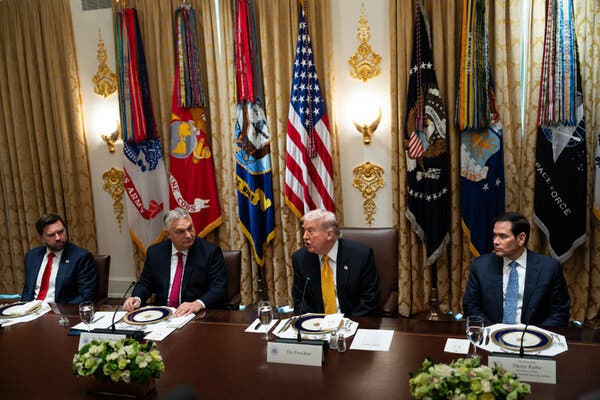President Donald Trump has granted Hungary a one-year exemption from U.S. sanctions targeting countries purchasing Russian oil. This decision followed a meeting with Hungarian Prime Minister Viktor Orban at the White House on March 15, 2024. The sanctions were aimed at pressuring Russia to cease its military actions in Ukraine.
According to a White House official who requested anonymity, the exemption is part of a broader agreement reached during the meeting. This marks a significant victory for Orban, who is facing a challenging re-election campaign. Shortly after the meeting, Orban announced the deal on social media, highlighting the exemption as a crucial development for Hungary’s energy security.
The agreement includes Hungary’s commitment to purchase liquefied natural gas from the United States, with contracts valued at approximately $600 million. In his post, Orban stated that Trump had “guaranteed full sanction exemptions” for Hungary’s major pipelines, namely TurkStream and Friendship. This arrangement allows Hungary to maintain some of the lowest energy prices in Europe.
Hungary’s reliance on Russian energy is significant, with the country importing approximately 86 percent of its oil from Russia. Orban has consistently expressed concerns that U.S. sanctions on Russia’s leading energy companies could threaten Hungary’s already sluggish economy. During the meeting, he reiterated that Hungary has fewer energy alternatives compared to its European neighbors due to its dependence on pipelines.
In a statement reflecting his understanding of Hungary’s situation, Trump remarked, “It’s a great country, it’s a big country, but they don’t have sea. They don’t have the ports, and so they have a difficult problem.” Despite this concession to Hungary, Trump criticized other European nations for continuing to purchase Russian oil, expressing his disappointment with their ongoing reliance on such imports.
The exemption granted to Hungary is notable, as it represents one of the most significant concessions made by Trump regarding the sanctions. These sanctions have been among the key measures implemented by the United States since the onset of the war in Ukraine. For months, the U.S. administration has urged European nations to halt their purchases of Russian oil, which is a vital source of revenue for Russia’s military operations.
Research from the Atlantic Council indicates that Hungary’s imports of Russian oil have surged since the beginning of Russia’s full-scale invasion of Ukraine in 2022. Orban has publicly aligned himself with Russian President Vladimir Putin, advocating for compromises that would see Ukraine cede territory to Russia in exchange for peace.
This recent development highlights the complexities of international energy politics and the ongoing challenges that countries like Hungary face in navigating their energy needs amidst geopolitical tensions. The relationship between the United States and Hungary continues to evolve, reflecting broader dynamics at play in the region as nations grapple with the implications of the conflict in Ukraine.








































































